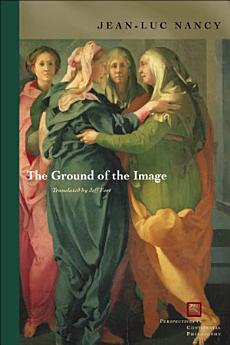The Ground of the Image
ສ.ຫ. 2009 · Fordham University Press
ປຶ້ມອີບຸກ
176
ໜ້າ
reportບໍ່ໄດ້ຢັ້ງຢືນການຈັດອັນດັບ ແລະ ຄຳຕິຊົມ ສຶກສາເພີ່ມເຕີມ
ກ່ຽວກັບປຶ້ມ e-book ນີ້
If anything marks the image, it is a deep ambivalence. Denounced as superficial, illusory, and groundless, images are at the same time attributed with exorbitant power and assigned a privileged relation to truth. Mistrusted by philosophy, forbidden and embraced by religions, manipulated as “spectacle” and proliferated in the media, images never cease to present their multiple aspects, their paradoxes, their flat but receding spaces.
What is this power that lies in the depths and recesses of an image—which is always only an impenetrable surface? What secrets are concealed in the ground or in the figures of an image—which never does anything but show just exactly what it is and nothing else? How does the immanence of images open onto their unimaginable others, their imageless origin?
In this collection of writings on images and visual art, Jean-Luc Nancy explores such questions through an extraordinary range of references. From Renaissance painting and landscape to photography and video, from the image of Roman death masks to the language of silent film, from Cleopatra to Kant and Heidegger, Nancy pursues a reflection on visuality that goes far beyond the many disciplines with which it intersects. He offers insights into the religious, cultural, political, art historical, and philosophical aspects of the visual relation, treating such vexed problems as the connection between image and violence, the sacred status of images, and, in a profound and important essay, the forbidden representation of the Shoah. In the background of all these investigations lies a preoccupation with finitude, the unsettling forces envisaged by the images that confront us, the limits that bind us to them, the death that stares back at us from their frozen traits and distant intimacies.
In these vibrant and complex essays, a central figure in European philosophy continues to work through some of the most important questions of our time.
What is this power that lies in the depths and recesses of an image—which is always only an impenetrable surface? What secrets are concealed in the ground or in the figures of an image—which never does anything but show just exactly what it is and nothing else? How does the immanence of images open onto their unimaginable others, their imageless origin?
In this collection of writings on images and visual art, Jean-Luc Nancy explores such questions through an extraordinary range of references. From Renaissance painting and landscape to photography and video, from the image of Roman death masks to the language of silent film, from Cleopatra to Kant and Heidegger, Nancy pursues a reflection on visuality that goes far beyond the many disciplines with which it intersects. He offers insights into the religious, cultural, political, art historical, and philosophical aspects of the visual relation, treating such vexed problems as the connection between image and violence, the sacred status of images, and, in a profound and important essay, the forbidden representation of the Shoah. In the background of all these investigations lies a preoccupation with finitude, the unsettling forces envisaged by the images that confront us, the limits that bind us to them, the death that stares back at us from their frozen traits and distant intimacies.
In these vibrant and complex essays, a central figure in European philosophy continues to work through some of the most important questions of our time.
ກ່ຽວກັບຜູ້ຂຽນ
Jean-Luc Nancy (Author)
Jean-Luc Nancy (1940-2021) was Distinguished Professor of Philosophy at the Université Marc Bloch, Strasbourg. His wide-ranging thought runs through many books, including The Literary Absolute, Being Singular Plural, The Ground of the Image, Listening, Corpus, The Disavowed Community, and Sexistence.
Jeff Fort (Translator)
Jeff Fort is Associate Professor of French at the University of California, Davis, and the translator of more than a dozen books, by Jean Genet, Jacques Derrida, Maurice Blanchot, Jean-Luc Nancy, and others.
Jean-Luc Nancy (1940-2021) was Distinguished Professor of Philosophy at the Université Marc Bloch, Strasbourg. His wide-ranging thought runs through many books, including The Literary Absolute, Being Singular Plural, The Ground of the Image, Listening, Corpus, The Disavowed Community, and Sexistence.
Jeff Fort (Translator)
Jeff Fort is Associate Professor of French at the University of California, Davis, and the translator of more than a dozen books, by Jean Genet, Jacques Derrida, Maurice Blanchot, Jean-Luc Nancy, and others.
ໃຫ້ຄະແນນ e-book ນີ້
ບອກພວກເຮົາວ່າທ່ານຄິດແນວໃດ.
ອ່ານຂໍ້ມູນຂ່າວສານ
ສະມາດໂຟນ ແລະ ແທັບເລັດ
ຕິດຕັ້ງ ແອັບ Google Play Books ສຳລັບ Android ແລະ iPad/iPhone. ມັນຊິ້ງຂໍ້ມູນໂດຍອັດຕະໂນມັດກັບບັນຊີຂອງທ່ານ ແລະ ອະນຸຍາດໃຫ້ທ່ານອ່ານທາງອອນລາຍ ຫຼື ແບບອອບລາຍໄດ້ ບໍ່ວ່າທ່ານຈະຢູ່ໃສ.
ແລັບທັອບ ແລະ ຄອມພິວເຕີ
ທ່ານສາມາດຟັງປຶ້ມສຽງທີ່ຊື້ໃນ Google Play ໂດຍໃຊ້ໂປຣແກຣມທ່ອງເວັບຂອງຄອມພິວເຕີຂອງທ່ານໄດ້.
eReaders ແລະອຸປະກອນອື່ນໆ
ເພື່ອອ່ານໃນອຸປະກອນ e-ink ເຊັ່ນ: Kobo eReader, ທ່ານຈຳເປັນຕ້ອງດາວໂຫຼດໄຟລ໌ ແລະ ໂອນຍ້າຍມັນໄປໃສ່ອຸປະກອນຂອງທ່ານກ່ອນ. ປະຕິບັດຕາມຄຳແນະນຳລະອຽດຂອງ ສູນຊ່ວຍເຫຼືອ ເພື່ອໂອນຍ້າຍໄຟລ໌ໄໃສ່ eReader ທີ່ຮອງຮັບ.







